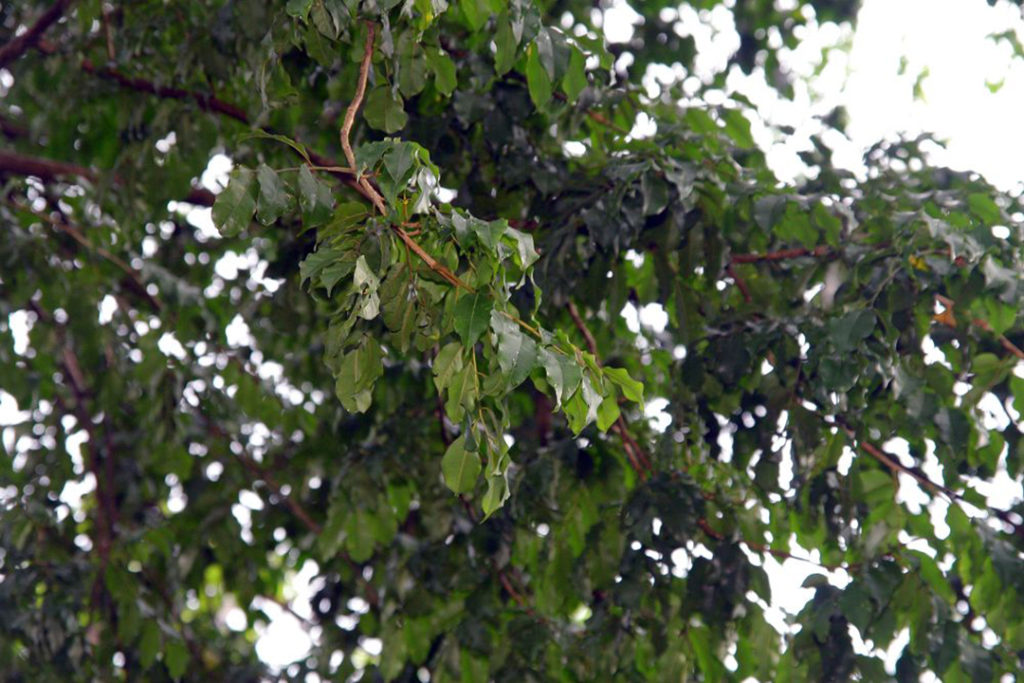
El Salvador
Balsam
Myroxylon balsamum

General Description / Cultural Significance
The scent of Balsam, Myroxylon balsamum, is representative of El Salvador as a country and has a long history of medical use, especially wound healing. El Salvador is rich in biodiversity and the balsam tree grows in dense Salvadorian forests. When its white flowers bloom, it stands out amongst the rest of the trees. The tree reaches a diameter of three feet and a height of up to one hundred fifty feet. It belongs to the leguminous family, which means it enriches the soil in which it grows.
The tree’s bark produces an aromatic liquid resin that is often described as having pungent smells of cinnamon and vanilla, yet tasting slightly bitter. Today this material is highly desired in perfume, but also is very important to a number of pharmaceutical preparations, as the resin, or sap, possesses a myriad of beneficial qualities. It is known to be antibacterial and antiseptic, and this explains why it is used traditionally to treat ailments such as colds, asthma, bronchitis, burns and wounds. Traditionally, the material was used by indigenous populations to stop bleeding, and to increase urination to expel worms. Balsam essential oil can be used in baked goods and its timber, which is resistant to fungal decay, is used for building construction and furniture manufacturing. It is used as a shade tree for coffee plantations.
The Catholic Church plays an important role in El Salvador’s culture, and the scent of balsam is included in religious rituals. The bark is burned as incense and the resin is mixed with olive oil to be used as a Chrism, in connection with the administration of sacraments.
Climate Change/Conservation Status
Dead mangrove trees are a common sight along the beaches of El Salvador. The Ministry of the Environment and Natural Resources (MARN) projected in 2012 that the country could lose 28 percent of its coastal territories in the next century as a result of rising seas caused by climate change. The deforestation has left the country highly vulnerable to the effects of climate change and the massive flash flooding it is bringing.
El Salvador’s economy has historically been dominated by agricultural products and in the early 20th century coffee accounted for 90 percent of its export earnings. The acclaimed Arabica coffee beans that have been the pride of the country were all but taken out by leaf rust disease in 2015. Coffee exports were dramatically reduced, and the country struggled to diversify their agricultural crops. Today, these food crops are dropping in yield due to the multiple threats of climate change. Many villages along the low-lying coastal areas are finding it increasingly difficult to make a living and may need to be moved. The small peanut farmers are at a crossroad too, just like coffee producers were. Hundreds of thousands lost their jobs and the growers that survived are struggling with warming temperatures. Farmers are working with researchers to develop plants that can adapt but such plants are expensive. Tens of thousands of Salvadorians are reported to have left their country for the U. S. or other countries.
Although the balsam tree is identified by the IUCN as of Least Concern for conservation needs, there are many existing economic, political, and social problems that are of great concern. Combined with the impacts that come with climate change and the increasing frequency of natural disasters, Salvadorians are facing a critical time.
Alternate Names
Peru Balsam
Tolu Balsam
Sources
Albert Vieille, n.d. Peru Balsam El Salvador. Givaudan. [website]
Climate Links, 2017. Climate Risk Profile: El Salvador. U.S. Agency for International Development. [website]
Gies, H., 2018. Once lush, El Salvador is dangerously close to running dry. National Geographic. [website]
Green, E., 2019. In El Salvador, climate change means less coffee, and more migrants. Public Radio International. [website]
Lonely Planet, n.d. El Salvador. Lonely Planet. [website]
Mission of El Salvador to the United Nations. This statement can be found on the World Sensorium original website.
Nations Encyclopedia, n.d. El Salvador – Forestry. Advameg. [website]
National Research Stewardship Circle. (2019). Peru Balsam. [online]
Tegel, S., 2012. El Salvador in battle against tide of climate change. The Independent. [website]

